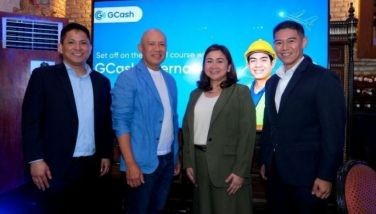Philippines' lady innovator
MANILA, Philippines - There just seems to be nothing that can stop a woman who has made innovation as part of her DNA, because for empowered entrepreneur Myla Villanueva, her innovative mind was able to create enterprises that are to be considered today as the lifeblood of connectivity.
It all started in 1988 — a period when the mainframes of computers were only being propagated and dominated by the likes of IBM, Dell, and other giant players.
Back then, Villanueva, who was just a fresh graduate of Santa Clara University in Silicon Valley, California, already felt it in her blood to do something to bring affordable connectivity to the smallest enterprises and communities of the country.
“I came home in 1988 and I saw that it was a mainframe country (Philippines). There was no innovation going on and I said to myself what an open field, what a nice environment to try to affect change,” she told The Star.
At that time, many things were already coming up in the global arena—technology-wise. But the country appears to be lagging behind. Smaller entrepreneurial companies had no ability to tap computers because mainframes were just for the use of big companies. Personal computers were just starting and Internet was not even there yet.
Of this, Villanueva said, “my dream was always to democratize information to ensure that everybody had access to it whether you are a big guy in a large corporate environment or someone in the provinces or sari-sari store who wanted to get in touch with a family member abroad.”
Thus in the age of mainframes, Villanueva, only 21 then, founded in 1988 the Micro D International (MDi) — a pioneer in networking in the country — through a $75,000 loan from her family, which she backed up with a P200,000 loan from the Far East Bank.
Slowly but surely, through MDi, the Internet started to come in and our products became mainstream, she said.
Though she had smaller companies using her mainframe, her big break for MDi came from the Social Security System (SSS), which under Renato Valencia was then modernizing its IT (Information Technology) capability to be globally competitive. The modernization of SSS’ IT program cost P20 million.
Preparing for it, she narrated: “I was enamored with the business models that were coming out from the (Silicon) valley. I also made sure to attend the annual world technology congress in Barcelona and even wrote these things for the (Philippine) Star.”
There, she had the chance to interview the CEOs of Blackberry and the creator of World Wide Web and the CEO of Barty, the Indian telecom company.
Roused by their stories, Villanueva worked double time to ensure the growth of her company. Soon enough, expansion plans were on the way.
At full speed
It then seemed inevitable for her loans to become bigger — from P200,000 to P500,000. But by the time it reached P2 million, a bank’s CEO sought her out to ask if she knew what she was doing with the money.
“I said we were growing and I was very nervous as that was the first time I had to prove a point with a bank president, let alone the father of my best friend (in high school),” she continued.
But confident to prove her point, she then began another venture, dubbed as the Microwarehouse, the current distributor of Apple, Blackberry, LG, and 3Com.
Villanueva recalled that starting this business was blessed with a perfect timing, since this was the period when former Philippine President Fidel V. Ramos deregulated the telecommunications industry to allow more players to invest in the sector.
Talking about the main business plan for it, she explained, “we were bringing down the products to the mainstream, through retail channels and through smaller systems integrators down to the provinces, which essentially the IBMs didn’t have the capacity to do because their systems were very large.”
But being in an industry where keeping up with innovations remains to be the key for a guaranteed success, Villanueva then set-up her third undertaking—Wolfpac, the company that developed the wireless Internet access in cell phones.
Of this, she said, “We were supplying the ringtones, logos, content and gaming, like the text to millions. And at the time we launched that, we had one million hits on the first day and our servers crashed. It became the game for months on end, which was followed by much iteration.” She handled Wolfpac for three years until Smart Communications bought it.
“The important thing is turning over new ideas each time,” she said of the acquisition. Yet, Villanueva showed no signs of slowing down. With another project in mind, she planned to take the concept of connectivity to another level; thus the birth of Meridian — the first broadband wireless provider in the country.
Explaining the concept, she said, “The idea there was it was so difficult to interconnect if the Internet was already there. Companies trusted that they can put data on top of the internet and consumers were beginning to access it.”
With Meridian having the largest broadband wireless implementation, Villanueva realized that such can be a tool to further educate people, as information is readily available online.
And since SM malls are strategically located nationwide, she asked for SM’s Tessie Sy-Coson’s nod to put up antennas on the roofs of SM malls in 20 or so sites in the country. “Our target was to bring connectivity to the universities,” she said.
“But after three years, the company was really over-stretched and since the technology was working, Smart bought us again, this is my second exit.” Meridian is now famously known as the SmartBro.
Moving forward
Villanueva’s most recent venture is Novare Technologies, where she is joined by TJ Javier (country manager of Microsoft, SAP, and Oracle) and Martin Lopez Vito.
Already known as a pioneer in the Philippine ICT (Information and Communications Technology) industry, she was one of those who provided the company with its “deep domain knowledge of mobile networks and the solutions that support them.”
Just this year, Novare Technologies was conferred by Globe Telecom with the VAS (Value-Added Services) Vendor of the Year Award for its outstanding performance and invaluable support to Globe Telecom for the year 2010.
As its partner, Novare is the provider of Globe’s New Store System Project, as it completely restructured the concept behind the Globe stores, redesigning the workflow of customer traffic and changing the business systems, thus enabling faster and more efficient servicing, cross-selling and up-selling.
Meanwhile for Smart, Novare has helped in the development of a product called Netphone, which is said to be a very reasonably-priced handset with high speed Internet access. “It means you don’t have to be in a physical location to access all the things you want,” she said.
Today, Villanueva, who has become the Philippines’ “it-lady” for anything ICT, is still on top of her game—continuously evolving and innovating. As early as now, she is already working on her sixth enterprise which, she said, will be launched in the next two years after the technology has been “fully tried and working.”
Indeed, with ventures here and there, one thing remains clear — no one can ever stop a woman who knows nothing but to innovate.
- Latest






























